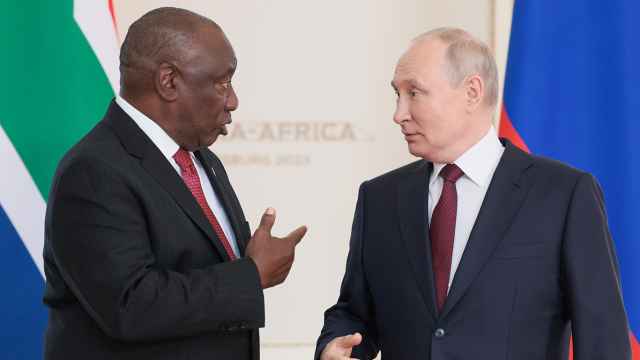The Communications and Press Ministry has its finger on the trigger of the starter's pistol, but no one knows when the race will begin or who is actually participating.
Once they are off and running, the players, who have already spent billions of dollars to get in shape, will have to overcome large hurdles, while the prize money keeps going down.
The race is all about winning market share for high-speed broadband mobile Internet. It will start when the Communications and Press Ministry issues the rights to use new radio frequencies, perhaps by the end of this year.
But even more important than the technology, industry players say, is whether operators will be able to create a viable business model to build the fourth-generation, or 4G, network.
Sky Link, an operator who targeted the mobile Internet market exclusively from its start seven years ago and now makes more than 50 percent of its revenue from Internet services, is cautious about future returns of the market as a whole.
"Its clear from the example of 3G that the growth of mobile data traffic doesn't bring a noticeable improvement to the industry's bottom line," Sky Link general director Gulnara Khasyanova told The Moscow Times. "The tariffs offered now for mobile Internet are even lower than those for fixed Internet."
Mobile phones are not just for talking anymore. People use them to read e-mail, check traffic and view truncated web sites. What might look like bells and whistles now will soon enough be taken for granted by everyone, just like the cell phone itself, said officials with Russia's leading mobile operators. People will demand even more speed and quality.
4G initially promises to offer a connection 10 times faster than 3G, and eventually speeds will be more than 300 times faster than today's fastest mobile data link. What will people do with so much speed? Anything they can do today with a good PC hooked up to a fast network.
Finding a Business Model
The likelihood of consumers taking more speed and services for granted might be the very reason why no one seems to be questioning whether there is a need to invest billions of dollars into a technology that most people have not even tried.
Before investing, however, operators will have to make the right technical decisions to support a challenging business model.
Network construction in a country as vast as Russia is not cheap. MegaFon has spent 8 billion rubles ($260 million) in 2010 so far on 3G network construction. By its estimate, building a modern mobile network from scratch to cover most of Russia would cost up to $7 billion, although MegaFon spokeswoman Tatyana Ivanova said the company feels it can leverage up to 80 percent of the existing infrastructure in an "evolutionary" migration to 4G.
That would still leave in excess of $2 billion to be spent by each major operator to upgrade to 4G. Multiply that by four, and overall investment will reach $8 billion to $10 billion.
Contrast that with the fact that total gross revenue from mobile data in 2009 was just $1.4 billion, according to ComNews Research. Mobile Internet traffic is forecast to grow 2.4 times between 2009 and 2010, and 4G will likely eat into the fixed Internet market, but it's still a marathon.
For Mobile TeleSystems' 3G network, company chief technology officer Andrei Ushatsky estimated a return on investment of four to five years. The average revenue per user is not likely to increase in such a competitive market, even with impressive new services, industry experts confirm. Currently, unlimited mobile Internet tariffs from the leading operators average about $15 per month.
Base stations for 4G are about 30 percent more expensive than those for 3G, according to VimpelCom. At the same time, though, the cost per square kilometer of coverage for 4G could actually be less than 3G if lower frequencies are used, since they have a greater coverage range.
VimpelCom and MegaFon representatives said they would prefer to get frequencies in the lower range to cover less densely populated areas and are likely to use a higher range in bigger cities.
In any case it is essential for roaming that the operators locally implement the standard technologies being rolled out abroad, otherwise there will be no mobility.
A bundle of money is at stake, with the domestic mobile market approaching $20 billion in annual revenue and 200 million subscribers by the end of 2010, according to statistics released by the Communications and Press Ministry earlier this month. So it is no wonder that there is controversy around a major step such as the launch of a next-generation network.
The initial standard for 4G transmission favored by operators in Russia and Europe is called Long Term Evolution, or LTE. It has been deployed on a small scale in a half-dozen countries since the end of last year. MTS launched an LTE network in Tashkent, Uzbekistan, in August, and pilot projects have been done in Russia by Rostelecom and MegaFon in Sochi and Yota in Kazan. Here, the road to full deployment is characteristically Russian: long and poorly lit.
Frequency Distribution
The radio frequencies needed by the operators to start deployment are now controlled by various internal government communications organizations, digital television, older mobile phone technologies and the Defense Ministry. They are just below the current 2G range of 900 megahertz and above the 3G range of 2.1 gigahertz. Getting access to these frequencies is proving difficult.
The State Committee for Radio Frequencies, the responsible body in the Communications and Press Ministry, was to have considered frequency distribution at a meeting last month, possibly giving frequencies to two entirely new players, industry sources said. The topic never made it to the agenda, thanks in part to a strongly worded joint letter from MegaFon, MTS and VimpelCom sent earlier in the summer to the government, demanding fair and transparent distribution.
On Wednesday, Konstantin Kosachyov, head of the State Duma's International Affairs Committee, told The Moscow Times that he had received a letter from his U.S. counterpart, Howard Berman, chairman of the House Committee on Foreign Affairs, expressing concern that American investors in MTS and VimpelCom might be hurt if Russia did not hold an open tender for 4G licenses.
A Communications and Press Ministry spokesman said in an e-mailed statement that the timing and agenda for the next meeting of the State Committee for Radio Frequencies was still being determined but it was expected to take place this year.
All the major operators say 4G is a question of "when," not "if." Khasyanova said Sky Link would "quickly upgrade the network to 4G" once the frequency issue is resolved.
MegaFon's Ivanova said it was realistic for her company to complete its 4G network within two years from starting work.
4G Handsets
Once the network is built, consumers will need telephones that operate in the new frequency ranges. Leading component and handset manufacturers are getting ready. Qualcomm has chipsets for LTE equipment in the works. Samsung launched an LTE device for notebooks.
Samsung hopes to be the first to market a 4G mobile phone in Russia, said Marina Doronina, Samsung's corporate PR manager for Russia.
But Russian companies do not intend to be left behind. Russian Technologies chief Sergei Chemezov demonstrated a prototype of a Russian-designed 4G telephone to President Dmitry Medvedev on Monday. The phones initially will be made in Taiwan, but eventually the manufacturing will move to Russia, Chemezov said on NTV television.
The operators are tracking 4G handsets closely. VimpelCom expects its first 4G handsets sometime next year. MegaFon is looking for a vendor partner for joint branding and distribution. So perhaps by next winter Ded Moroz will be taking requests for 4G telephones.
What can people do with a 4G phone? Any web-based service with heavy uplink requirements, like video conferencing, will shine on a 4G network.
Ilya Segalovich, chief technology officer for Yandex, the leading Russian Internet search engine, is excited about the wealth of services 4G will bring. "Video will be added to everything — live broadcasts of public and private events; blogs will become video blogs," he said.
MTS makes many of its own 3G services, including a portal for downloading licensed content like movies and music, called Omlet.ru, and may offer new services on 4G specifically designed for its corporate customers. All the operators will rely on such services, along with their brand power and targeted tariff plans, to help them win market share.
"We see the start of the 4G network rollout as a major milestone for the development of the country's infrastructure and the economy as a whole," VimpelCom spokeswoman Anna Aibasheva said.
The benefits for customers seem limitless. "Users will search for places, things and people through real-time object and facial recognition, using images captured on the mobile phone camera," Segalovich said. "And, of course, you'll see on your phone live video of what's happening on the roads."
While mobile operators ponder the hurdles set up by Russia's geography, demographics and bureaucracy, consumers are in the stands, cheering the operators on, perhaps occasionally distracted by vibrating, squawking phones and thoughts about what 5G is going to look like.
A Message from The Moscow Times:
Dear readers,
We are facing unprecedented challenges. Russia's Prosecutor General's Office has designated The Moscow Times as an "undesirable" organization, criminalizing our work and putting our staff at risk of prosecution. This follows our earlier unjust labeling as a "foreign agent."
These actions are direct attempts to silence independent journalism in Russia. The authorities claim our work "discredits the decisions of the Russian leadership." We see things differently: we strive to provide accurate, unbiased reporting on Russia.
We, the journalists of The Moscow Times, refuse to be silenced. But to continue our work, we need your help.
Your support, no matter how small, makes a world of difference. If you can, please support us monthly starting from just $2. It's quick to set up, and every contribution makes a significant impact.
By supporting The Moscow Times, you're defending open, independent journalism in the face of repression. Thank you for standing with us.
Remind me later.







